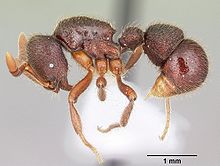Proceratium
| Proceratium | |
|---|---|
 |
|
| Proceratium google worker, holotype specimen | |
| Scientific classification | |
| Kingdom: | Animalia |
| Phylum: | Arthropoda |
| Class: | Insecta |
| Order: | Hymenoptera |
| Family: | Formicidae |
| Subfamily: | Proceratiinae |
| Tribe: | Proceratiini |
| Genus: |
Proceratium Roger, 1863 |
| Type species | |
|
Proceratium silaceum Roger, 1863 |
|
| Diversity | |
| 82 species | |
| Synonyms | |
|
Sysphingta Roger, 1863 |
|
Sysphingta Roger, 1863
Proceratium is a rare genus of ants in the subfamily Proceratiinae. It is the type genus of the tribe Proceratiini, which in addition to Proceratium consists of two even rarer genera: the extant Discothyrea and the fossil genus Bradoponera.
The genus is rare, but widespread throughout the northern temperate and tropical zones. In the Old World, it is distributed from Spain to Japan, in sub-Saharan Africa, Mauritius, the Malay Archipelago, New Guinea, Queensland (Australia) and Fiji. In the New World, it is known from Canada to Brazil (and some Caribbean islands).
Colonies are relatively small, usually containing less than 200 individuals. They nest in soil, in rotten wood, under stones, or on tree branches. Similar to its sister genus Discothyrea, some species are specialist predators of arthropod eggs, mainly spider eggs.
...
Wikipedia
